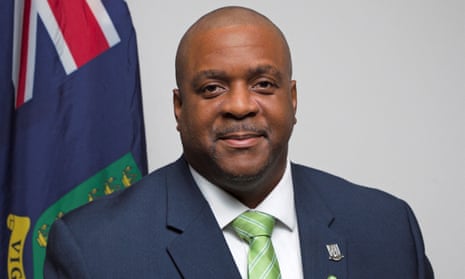The premier of the British Virgin Islands has demanded his immediate release from US custody, arguing he is immune from prosecution on cocaine-smuggling charges because he is the elected, constitutional head of government of the British overseas territory.
An attorney for Andrew Fahie made the request in a filing with Miami federal court on Monday.
Fahie, 51, was arrested last week during a US Drug Enforcement Administration (DEA) sting as he was preparing to board a private jet in Miami.
According to a criminal complaint, Fahie and Oleanvine Maynard, his ports director, had been at the airport to meet who they thought were Mexican drug traffickers but in reality were undercover DEA agents. In the criminal complaint, Maynard refers to Fahie as a “little crook sometimes” who would not hesitate to profit from a plan cooked up with the help of self-proclaimed Lebanese Hezbollah operatives to move mass quantities of cocaine and drug proceeds through the Caribbean island.
The shock arrest roiled the British Virgin Islands, where Fahie was already facing allegations of widespread corruption, and seemed to bolster calls to suspend the constitution for two years to clean up government and return to home rule by officials from London.
Fahie’s attorney did not respond to a request for comment and in her two-page filing did not provide details about her client’s immunity claim. Fahie, who also serves as the finance minister, was said to have traveled to Miami to attend a conference for the cruise industry and ahead of his departure had appointed a deputy to act as premier in his absence.
But any battle to assert immunity is likely to face numerous obstacles.
“Diplomatic immunity doesn’t protect you if you’re on your own private boondoggle,” said Dick Gregorie, a former federal prosecutor in Miami who in the 1980s indicted the prime minister of Turks and Caicos, another British colony, on drug charges and the then Panamanian strongman Gen Manuel Noriega.
Still, prosecutions of foreign officials are rare and going after the Caribbean island’s top elected official would certainly have been greenlit at the highest levels of the US justice department and state department given the potential impact.
For example, federal prosecutors in New York waited for Honduras’s President Juan Orlando Hernández to step down this year before indicting him on allegations of drug trafficking that first came to light in the trial of his brother.
“This isn’t done willy-nilly. Prosecutors are clearly very confident in the evidence,” said Gregorie.
The string of islands of 35,000 people east of Puerto Rico is currently under a 2007 constitution giving it limited self-governance.
Governor John Rankin, who is the Queen’s representative to the islands and its ultimate executive authority, said the arrests prompted him to release – earlier than originally intended – a report by a commission of inquiry launched in January 2021 to investigate allegations of widespread government fraud.
Rankin said the inquiry concluded that millions of dollars were spent on projects, some of them linked to allies of the premier, that were abandoned or found to be of no public benefit.
“Some of them were, on their face, false,” the governor said.
The commission had concluded that “unless the most urgent and drastic steps are taken, the current situation with elected officials deliberately ignoring the tenants of good governance will go on indefinitely”, Rankin told the televised news conference.
